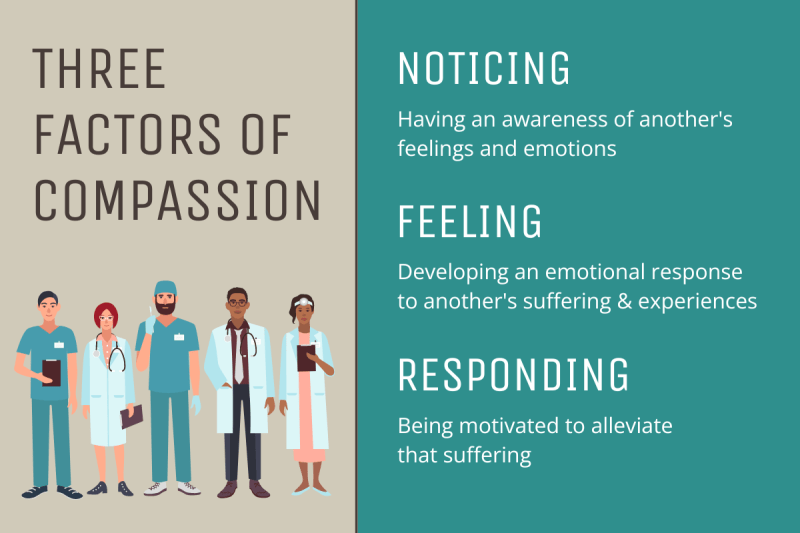
Compassion is one of the most important elements in health care. Its presence or absence can be a determining factor for whether patients are properly cared for. Compassion is of such importance that most healthcare organizations, institutions and governing bodies have established it as a crucial tenet in their ethical guidelines.
For example, the American Medical Association’s Principle of Medical Ethics states in its very first point that medical services should be provided with “compassion and respect for human dignity.”
The United Kingdom’s National Health Service lists compassion as one of the six core values in its constitution. In addition, many countries around the world mandate that compassion be exhibited in healthcare, according to a 2011 Hastings Center Report.
In contrast, the effects of compassionless healthcare are enormous and have led to disastrous outcomes. There have been numerous cases when patients have been neglected or treated without dignity in a healthcare setting, which have often turned into hospital-wide scandals.
Human beings are often at their most vulnerable when they are in need of medical attention. How doctors, nurses and other healthcare practitioners and workers treat those human beings in those states can have an immense impact on the patients’ experience.
What exactly is the role of compassion in healthcare? To answer that question we must first define the word compassion.
How is compassion defined in healthcare?
The Oxford Learner’s Dictionary defines compassion as a “strong feeling of sympathy for people or animals who are suffering and a desire to help them.” Researchers studying compassion in the healthcare field especially emphasize the second half of the definition, “ a desire to help them.”
Compassion involves feeling for another’s suffering but it must be accompanied by a strong desire to help the person that is suffering.
According to an American Behavioral Scientist study, compassion involves three main factors:
- Noticing: having an awareness of another’s feelings and emotions
- Feeling: developing an emotional response to another’s suffering and experiences
- Responding: being motivated to alleviate that suffering

One study from Clinical Psychology Review summarizes research on compassion in healthcare. It defines compassion as a “cognitive, affective, and behavioral process” that involves five main elements.
The recognition of suffering
The understanding of the “universality of suffering in human experience”
An emotional connection with another person’s distress or suffering (what they also call emotional resonance)
A tolerance for the uncomfortable emotions that come with empathizing with another’s suffering
A strong motivation to act and alleviate that suffering
Although compassion involves empathy, it does not stop there. Empathy is the emotional response that one has to someone else’s experience. In other words, the ability to put yourself in another’s shoes. Most people have empathy but not everyone will respond to that empathy. Compassion has to include that response.
What are some limitations around compassion in healthcare?
Compassionate care has many benefits. Compassionate care is very beneficial for patients. However, it can often pose significant challenges for healthcare professionals. Here are some limitations to compassionate care that are important to keep in mind.
One of those is that not all compassionate care is devoid of pain or discomfort for the patient. According to a Clinical Ethics editorial, compassion does not mean that a healthcare practitioner needs to let go of necessary but painful procedures or treatments for the patient.
After all, many medical treatments involve a certain level of discomfort or pain for the patient. At times, it is indeed necessary for practitioners to detach themselves emotionally so as to be able to follow through with painful procedures.
What the authors of the Clinical Ethics editorial advocate for is reaching a middle ground where compassionate care is provided even if the presence of pain and discomfort is inevitable.
Another limitation that has been researched extensively is what scholars call “compassion fatigue. ”According to a study in the Journal of Pain & Symptom Management, compassion fatigue is “a specific type of burnout that follows exposure to patient trauma and suffering and manifests in marked emotional, behavioral and cognitive changes in the clinician.”
This phenomenon has been especially studied in doctors and nurses who have felt emotionally exhausted and burned out. Recent rises in negative sentiments toward nurses has also contributed to burnout and safety issues, making compassionate care challenging to sustain. Compassion fatigue is a real problem and can lead to harmful outcomes such as lack of empathy, apathy, lack of energy, patient dissatisfaction, poor quality of care and even medical errors.
Some researchers, however, are wary of the term “compassion fatigue” because it presupposes that compassionate care in and of itself is the cause for burnout, when often other factors need to be present for this type of phenomenon to occur (factors include lack of staff & resources, not enough time for breaks and rest, poor self-care practices like lack of boundaries, rising hostility towards healthcare workers, and many others).
Such an association can lead some to want to leave behind compassionate care altogether, an act that would greatly reduce the benefits that compassionate care can bring both for the patient and for the health care professional. In fact, research shows compassionate approaches to health care are “pleasurable, increase social connections, decrease the focus on oneself” and protect against stress.
__________
Who are you called to be?
Pursue your purpose at PLNU.
__________
Why is compassion important and what are its benefits?
Some scholars argue that compassion is unnecessary for proper care. For example, why would anyone need compassion to change a patient’s bedpan, or perform a surgery when the patient’s unconscious?
However, it’s important to remember that these tasks are never done in isolation, and likely require significant interaction with the patient before and after they are done. How a practitioner interacts with the patient in these in between times can make or break their experience.
For example, a patient could exhibit some fear or anxiety before a major surgery, therefore requiring some reassurance and comfort from their physician.
Let’s say that a patient finds bedpan changes to be humiliating and uncomfortable. How a nurse handles that particular experience can help reduce that discomfort for them. What happens if something goes wrong during a surgery or procedure? How is the doctor going to communicate that to the patient so as not to provoke even more distress in a patient who is already in a vulnerable situation mentally and emotionally?
These are just a few examples of that illustrate how crucial compassion is and how important it is for healthcare workers to practice it in their everyday interactions with patients.
The good news is that there are proven benefits to compassionate care.
According to a Frontiers in Psychology study, compassion has the following benefits:
Compassion:
- Can reduce patient anxiety
- Improves patient satisfaction
- Strengthens the patient/physician/caregiver relationship
- Decreases likelihood of the patient developing PTSD after a health emergency
- Can lead to better health outcomes
- Helps doctors/healthcare workers provide better care
- Leads to higher job satisfaction and job retention for workers
- Activates pleasure centers in the brain for healthcare workers
- Can lead to less malpractice suits
- Can generate more money for a healthcare system
Now that we’ve looked into the role of compassion in healthcare, here are some tips on how healthcare professionals can practice compassion with their patients.
How can health professionals be more compassionate?
The great thing about compassion is that it can be developed over time.
Here are some great tips:
1. Practice self-compassion
According to Mind Body Green, one of the ways you can begin to practice compassion is by being compassionate towards yourself. The presence or absence of compassion in your behavior can often be related to how you relate to your own problems. That’s why it’s important for you to practice self-compassion. You can do so by seeking out therapy, frequenting journaling or targeted meditation. The more compassion you show yourself the better you’ll be able to show to others.
2. Question your judgment of others
Judging others is an inherent human trait. It’s going to happen. But you can catch yourself when it does and redirect your thoughts toward ones of compassion. As suggested by Very Well Mind, you can practice more compassion by redirecting your thoughts from judgment of others and making room for people’s personalities, thoughts and behaviors. Remember to practice empathy and put yourself in another’s shoes.
3. Be kind, but avoid people-pleasing
Kindness is necessary but it’s also important to have boundaries. You cannot please everyone and inevitably there will be difficult patients you’ll have to deal with. Kindness should be the rule, but don’t neglect yourself and your own dignity in the process.
4. Finally, take good care of yourself
Don’t neglect yourself. It can be difficult to avoid doing so given how healthcare settings can often be stressful and leave you with little time for self-care. The National Institute of Mental Health offers some great advice for self-care including regular exercise, healthy eating and mindfulness practices like positive thinking and gratitude. These are all great tips to try to implement into your life. As much as you can, take good care of yourself and don’t neglect your own mental, emotional and physical health.
Learn compassionate care at PLNU
PLNU offers plenty of opportunities to learn how to care better for others in the School of Nursing and College of Health Sciences. Discover your calling as you learn how to help patient populations you’re passionate about.
